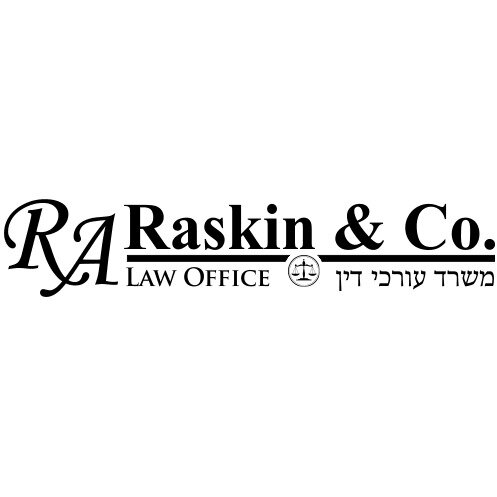Best Discrimination Lawyers in Haifa
Share your needs with us, get contacted by law firms.
Free. Takes 2 min.
List of the best lawyers in Haifa, Israel
About Discrimination Law in Haifa, Israel
Discrimination in Haifa, Israel, encompasses unfair or prejudicial treatment based on various categories such as race, religion, gender, age, disability, sexual orientation, and more. The laws in Haifa, and broadly in Israel, are stringent to protect individuals from such adverse treatment. These laws aim to create an inclusive and fair environment in workplaces, educational institutions, public services, and other facets of daily life.
Why You May Need a Lawyer
Legal help in discrimination cases is often essential due to the complexity of the laws and the need for a professional to navigate the legal system. Common situations requiring a lawyer include:
- Experiencing workplace discrimination based on race, gender, or other protected categories.
- Facing discrimination in educational institutions.
- Being denied public services or accommodations due to disability or other characteristics.
- Encountering discriminatory practices in housing or real estate transactions.
- Seeking redress for harassment or retaliation after reporting discrimination.
Local Laws Overview
Several key laws govern discrimination protection in Haifa, Israel:
- The Israeli Equal Employment Opportunities Law (1988): Prohibits discrimination in employment based on gender, race, age, sexual orientation, religious affiliation, and more.
- The Prevention of Sexual Harassment Law (1998): Aims to combat sexual harassment and create a safe work environment.
- The Prohibition of Discrimination in Products, Services, and Entry into Places of Entertainment and Public Places Law (2000): Ensures equal access to services and public places regardless of nationality, religion, gender, and other attributes.
- The Equal Rights for Persons with Disabilities Law (1998): Ensures that individuals with disabilities have equal rights in employment, public services, and other areas.
Frequently Asked Questions
What constitutes discrimination under Israeli law?
Discrimination involves unequal or unfair treatment based on protected characteristics such as race, religion, gender, age, disability, and sexual orientation.
How can I prove that I was discriminated against?
Documentation, witness testimony, and any records of the discriminatory behavior can be crucial. A lawyer can help gather and present this evidence effectively.
What should I do if I face discrimination at work?
Report the incident to your employer or human resources department, document the incidents, and consult a lawyer for legal guidance.
Can I be fired for filing a discrimination complaint?
Retaliation for filing a discrimination complaint is illegal. If you face such retaliation, you may have grounds for an additional legal claim.
How long do I have to file a discrimination lawsuit?
The time limit, or statute of limitations, can vary depending on the type of discrimination and jurisdiction. It's essential to consult a lawyer promptly to ensure you meet any deadlines.
Are there any government agencies that handle discrimination complaints?
Yes, the Israeli Ministry of Labor, Social Affairs and Social Services, and the Equal Employment Opportunity Commission can handle some types of complaints.
What remedies are available for victims of discrimination?
Remedies can include reinstatement to a job, back pay, compensation for emotional distress, and legal fees.
Can a lawyer help with mediation or settlement negotiations?
Yes, a lawyer can assist in negotiating settlements or representing you in mediation to resolve the dispute outside of court.
Is legal aid available for discrimination cases?
Certain non-profit organizations and government agencies may offer legal aid or assistance to individuals who qualify based on income or other criteria.
Do discrimination laws apply to small businesses?
Yes, generally, discrimination laws apply to employers and service providers of various sizes, though certain specifics may vary. Legal guidance can clarify these details based on your situation.
Additional Resources
For further assistance, consider contacting the following resources:
- The Israeli Ministry of Labor, Social Affairs and Social Services: Provides information and handles complaints about employment discrimination.
- The Israeli Equal Employment Opportunity Commission: Offers resources and can process certain discrimination complaints.
- Local Legal Aid Clinics: Many universities and law schools have legal clinics that offer free or low-cost advice and representation.
- Non-Governmental Organizations (NGOs): Organizations such as Kav LaOved and NIF (New Israel Fund) often provide resources and support for discrimination issues.
Next Steps
If you believe you are a victim of discrimination and need legal assistance, taking these steps can help you proceed:
- Document Everything: Keep detailed records of incidents, communications, and any other relevant information.
- Seek Legal Advice: Consult with a lawyer specializing in discrimination law to evaluate your case and understand your options.
- File a Complaint: Depending on your case, you may need to file a complaint with a relevant government agency or pursue a lawsuit.
- Stay Informed: Keep abreast of any new developments in discrimination laws or related news that could impact your case.
Remember, addressing discrimination is not just about seeking redress for yourself, but also about fostering a fair and inclusive society.
Lawzana helps you find the best lawyers and law firms in Haifa through a curated and pre-screened list of qualified legal professionals. Our platform offers rankings and detailed profiles of attorneys and law firms, allowing you to compare based on practice areas, including Discrimination, experience, and client feedback.
Each profile includes a description of the firm's areas of practice, client reviews, team members and partners, year of establishment, spoken languages, office locations, contact information, social media presence, and any published articles or resources. Most firms on our platform speak English and are experienced in both local and international legal matters.
Get a quote from top-rated law firms in Haifa, Israel — quickly, securely, and without unnecessary hassle.
Disclaimer:
The information provided on this page is for general informational purposes only and does not constitute legal advice. While we strive to ensure the accuracy and relevance of the content, legal information may change over time, and interpretations of the law can vary. You should always consult with a qualified legal professional for advice specific to your situation.
We disclaim all liability for actions taken or not taken based on the content of this page. If you believe any information is incorrect or outdated, please contact us, and we will review and update it where appropriate.










